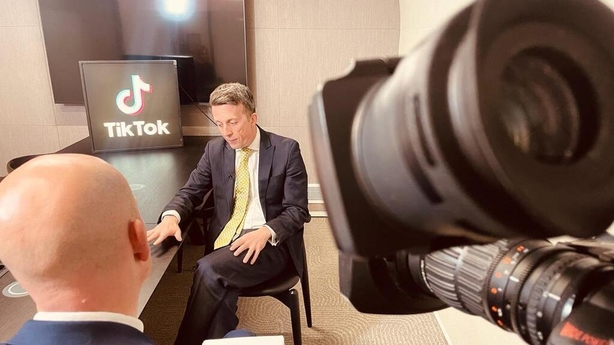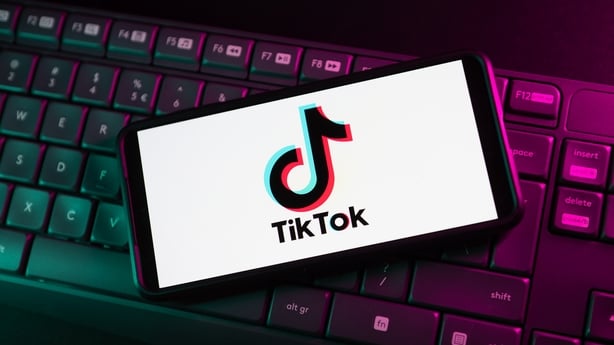A senior executive at TikTok has said it is sensible for the Irish Government to seek fresh security advice about the use of the video-sharing app.
It follows a recent EU decision to ban the Chinese-owned platform on official devices used by staff over cybersecurity fears.
The Irish Data Protection Commissioner met with the National Cyber Security Centre today to discuss potential concerns about TikTok.
In an interview with RTÉ News, Theo Bertram, TikTok Vice President of Government Relations and Public Policy for Europe, said they were surprised, disappointed and blindsided by the EU's decision to ban the app on staff devices.
He denied that China was using TikTok to spy on users.
"TikTok is not available in China, TikTok only operates outside of China, the Chinese government never asked for data from our users in Europe we would never allow that to happen and we are putting even stronger protections in place to make sure that isn't possible," Mr Bertram said.

Following the EU ban, the Minister for Justice Simon Harris said the Government was seeking fresh security advice on the use of TikTok on official devices.
"I think it's a really sensible thing to do, to make up their minds for themselves, not just make a decision because someone else has but to judge it for themselves on the basis of the facts and I applaud them for doing that," Mr Bertram said.
He described Ireland as an important place for TikTok and the home of the company's European operations.
TikTok has 3,000 Irish-based employees and has plans to open a second data centre in Ireland as well as a Transparency Centre in Dublin.
"We are the fastest growing employer in Ireland, announcing 1000 additional jobs last year," Mr Bertram said.
"I’m sure that we will continue to grow in Dublin. It’s a great home for us and we love it there," he added.
Asked about concerns that young people are spending too much time on the app, he said that TikTok recently introduced a 60-minute screentime cap for teenagers.
"My message to parents is that if your child is under 13 they shouldn’t be on the app to be honest."
"I have a 12-year-old son and he's not on the app and he's pretty gutted about it," Mr Bertram said.
Asked about criticisms when it comes to the removal of harmful content, he said that TikTok takes down 100 million videos every three months and that 95% of them are removed before they have been viewed.
Mr Bertram added that this is done through a combination of algorithms and human moderation.

Last year, the US banned the app from federal government devices, and some US politicians are trying to bring in wider restrictions.
TikTok said it was disappointed by the European Commission's decision which it described as misguided and based on fundamental misconceptions.
The company said it is continuing to enhance its approach to data security by further reducing employee access to data and minimising data flows outside of Europe.
TikTok has announced plans for a second data centre in Ireland and a third in another European location.
The company is to open a European Transparency and Accountability Centre in Dublin which it says will allow experts to see first-hand how it handles data securely.
The Data Protection Commission is currently carrying out two investigations into TikTok.
One relates to the processing of children's data, which should be concluded in around three months' time.
The other inquiry is looking at the transfer of personal data by TikTok to China.
"In terms of the investigation into transfers to China, that is now significantly advanced," Ms Dixon said.
"We will be submitting to TikTok relatively soon a preliminary draft decision for their final submissions before we send it off to our counterparts in the EU," she added.
The National Cyber Security Centre (NCSC) issues guidance to Government departments and office holders on the security of mobile devices.
"This guidance is based on risk assessments appropriate to the circumstances and is kept under continuous review by the NCSC," a spokesperson said.






